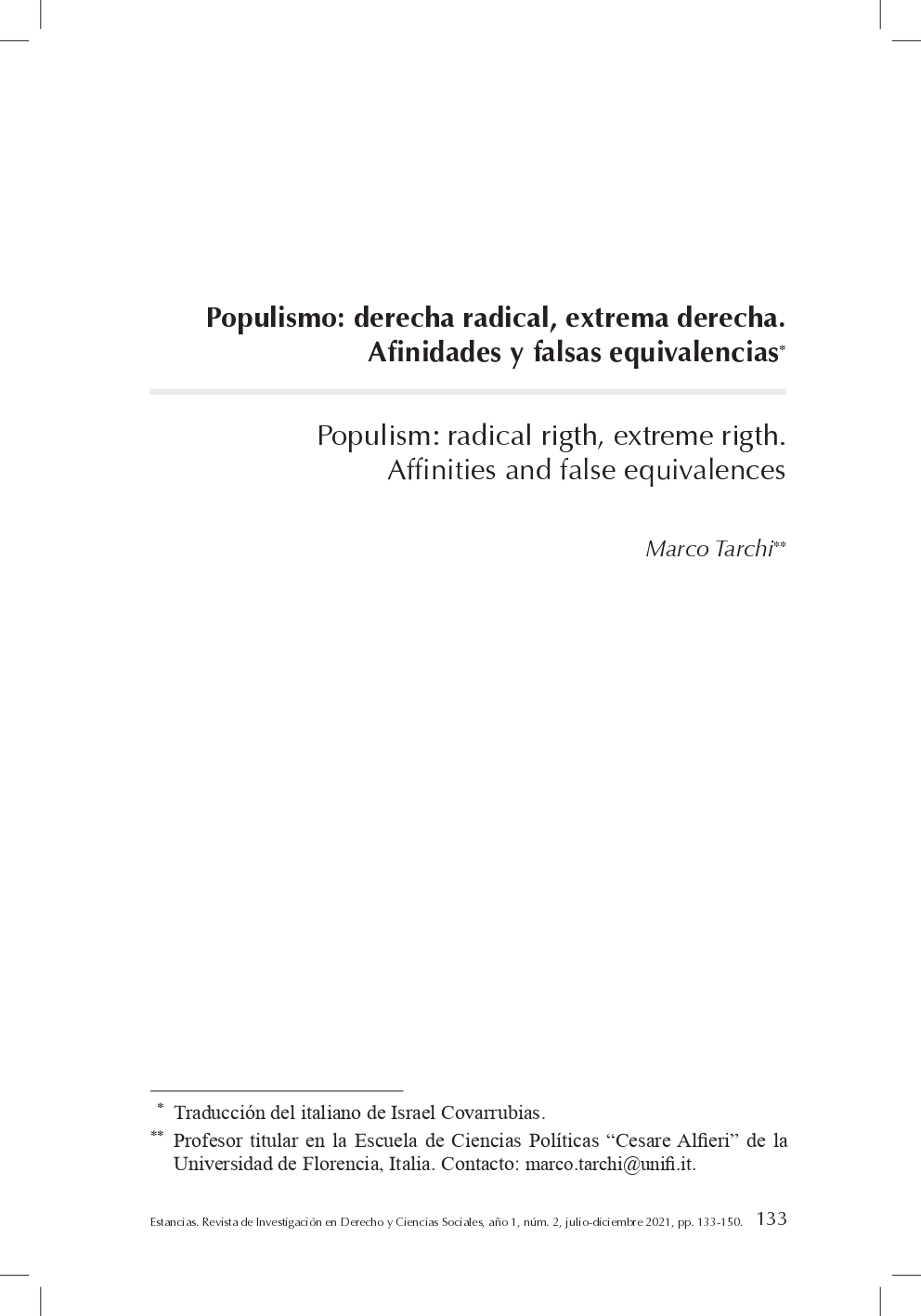Populism, radical rigth, extreme rigth: affinities and false equivalences
Main Article Content
Abstract
The new forms of populism that have appeared in the European political scene in recent decades have been insistently framed within the category of “extreme right”. However, despite the fact that in some áreas the categories of “populism” and “extreme right” can be close to each other and even, in some cases, coincide, they are clearly two distinct subjects. The concept which the “extreme
right” formula expresses is very vague and both its connotation and denotation have an extremely variable geometry, therefore using it to interpret the contents and forms of action of populist parties is useless and constitutes a mistake that needs to be abandoned. This false equivalence, in the scientific field, impoverishes the possibilities of better understanding both populism and extreme right. Today, a growing number of analysts have realized that this approach to the problem is inadequate and often counterproductive, since it has little use for a serious analysis that allows an understanding of the passions, concerns and expectations that have driven important sectors of the European electorate to gather around populist parties. It is necessary to examine the empirical relations
between populist and extreme right political groups in order to find out on the theoretic field the affinities and differences between this two ideal matrices. In this article, some differences between the two categories are presented, with the intention of highlighting some key elements of this difference.
Article Details

This work is licensed under a Creative Commons Attribution-NonCommercial 4.0 International License.
How to Cite
References
Art, D. (2011). Inside the Radical Right. Cambridge: Cambridge University Press.
Beyme, K. v. (1996). Party Leadership and Change in Party Systems: Towards a Postmodern Party State? Government and Opposition, XXXI, (2), pp. 135-159.
Berezin, M. (2008). Illiberal Politics in Neoliberal Times. Cambridge: Cambridge University Press.
Betz, H.-G. (1994). Radical Right-Wing Populism in Western Europe. Nueva York: St. Martin’s Press.
Betz, H.-G. (1998). Introduction. En Hans-Georg Betz y Stefan Immerfall (coords.). The New Politics of the Right. Neo-Populist Parties and Movements in Established Democracies (pp. 1-10). Houndmills-Londres: Macmillan.
Betz, H.-G. (2004). La droite populiste en Europe. París: Autrement.
Biorcio, R. (2019). La rivincita del Nord. La Lega dalla contestazione al governo. Roma-Bari: Laterza.
Braun, A., y S. Scheinberg (coords.), (1997). The Extreme Right. Freedom and Security at Risk, Boulder: Westview Press.
Ignazi, P. (1997). The Extreme Right in Europe: A Survey. En P. H. Merkl y L. Weinberg (coords.). The Revival of Right-Wing Extremism in the Nineties (pp. 47-64). Londres-Portland, Frank Cass.
Ignazi,, P. (1994). L’estrema destra in Europa. Boloña: Il Mulino.
Mény, Y., e Y. Surel (2000). Par le peuple, pour le peuple. Le populisme et les démocraties. París: Fayard.
Merkl, P. H. (1997). Introduction. En P. H. Merkl y L. Weinberg (coords.). The Revival of Right-Wing Extremism in the Nineties (pp. 1-15). Londres: Frank Cass.
Mudde, C. (1996). The War of Words. Defining the Extreme Right Party Family. West European Politics, XIX, (2), pp. 225-248.
Mudde, C. (2007). Populist Radical Right Parties in Europe. Cambridge: Cambridge University Press.
Priester, K. (2009). Populismo e fascismo. Ponencia en el Congreso Anatomia del populismo. Il populismo tra fascismo e democracia. Boloña: Universidad de Bologna-Universidad Humboldt de Berlín, 4-5 junio.
Reynié, D. (2013). Les nouveaux populismes. París: Fayard/Pluriel.
Riedlsperger, M. (1998). The Freedom Party of Austria: From Protest to Radical Right Populism. En H.-G. Betz y S. Immerfall (coords.). The New Politics of the Right. Neo-Populist Parties and Movements in Established Democracies (pp. 27-43). Houndmills-Londres: Macmillan.
Rokkan, S. (1974). Cleavage Structure, Party Systems, and Voter Alignments: An Introduction. En S. M. Lipset y S. Rokkan (eds.). Party Systems and Voter Alignments (pp. 131-229). Nueva York: The Free Press.
Scheinberg, S. (1997). Conclusions. En A. Braun y S. Scheinberg (coords.). The Extreme Right. Freedom and Security at Risk (pp. 250-257). Boulder: Westview Press.
Taguieff, P.-A. (2012). Le nouveau national-populisme. París: CNRS.
Tarchi, M. (2002). Radicalismo de derecha y neofascismo en la Europa de postguerra. En J. Antón Mellón (coord.). Orden, jerarquía y comunidad. Fascismos, dictaduras y postfascismos en la Europa contemporánea (pp. 247 276). Madrid: Tecnos.
Tarchi, M. (2015). Italia populista. Dal qualunquismo a Beppe Grillo. Boloña: Il Mulino
